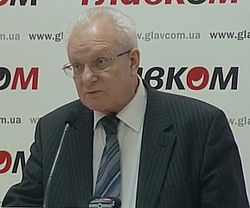Ukrainian civil society is worried that the National Anti-Corruption Bureau of Ukraine (NABU), the institution created in 2015 to investigate cases regarding top-corruption, could lose its independence. The worries are caused by the two auditors for the institution, who were appointed just recently in June. They will form a commission with the goal of conducting an independent external evaluation of NABU’s work each year. It also has the power to initiate the resignation of NABU’s head.
Since its creation, NABU was headed by Artem Sytnyk whose independence is believed to be key for the success of the institution – during the three years of NABU’s work, it submitted over 135 cases to courts. However, the political independence of the new auditors, Volodymyr Vasylenko and Pavlo Zhebrivsky, is under question.
“During the next year, one of the main questions on the anti-corruption agenda will be defending the NABU from the attacks from politicians. They openly want to wipe it out. They want Sytnyk to leave so the institution will be destroyed,” Oleksandr Liemienov, the Founder of StateWatch and an anti-corruption expert of the reform NGO coalition Reanimation Package of Reforms, told Euromaidan Press.
NABU is an investigative institution which is regarded as the most independent anti-corruption body in Ukraine. Its effectiveness might be explained by the fact that it was the first that was created when the government and state top-officials underestimated the threat from such an institution. The anti-corruption activists connect the independence of the institution to the independence of its head Sytnyk. And his appointment became possible due to the participation of international experts in the selection process:
“People with a high reputation, experience, vision on the formation of such bodies were present in the competition commission which was selecting the head of NABU,” explains Liemienov. The expert states that after the success of NABU, the government became more cautious during forming of the new anti-corruption bodies as they pose a direct threat to them and their inner circle.
Among NABU’s high-profile cases is the one against the Fiscal Service Roman Nasirov who is suspected in causing damage to the state in the amount of UAH 2bn ($ 73.7mn) and the one against the gray cardinal of Ukraine’s politics Mykola Martynenko who is accused of embezzling more than $17.2 mn from the state enterprise “Eastern Mining and Processing Plant” (SkhidGZK). There are notable cases against Odesa Mayor Hennady Trukhanov, Interior Minister Arsen Avakov’s son Oleksandr Avakov, Central Election Commission chairman Mykhailo Okhendovsky
and Deputy Defense Minister Ihor Pavlovsky which have not been sent to trial so far.
Read more:
- The case against Ukraine’s Fiscal Service chief might break the corrupt political system
- Ukraine’s first anti-corruption case against top official becomes soap opera
- New high profile arrest is a test for Ukraine’s anti-corruption agencies
A negative conclusion of the audit is the only legal reason for dismissing the head of NABU and reducing the state’s funding for the institution.
The auditors of the commission are selected from three quotas – one from the government, one from the Verkhovna Rada (Parliament), and one from the president. The annual evaluation includes a selective audit of the cases where the pre-trial investigation has been completed.
“To wipe out the NABU, it has to be beheaded. One of the real reasons to dismiss Sytnyk is a negative conclusion of the audit which leads to the voting in parliament. How do you think the MPs will vote regarding the negative opinion of the auditors if the NABU is investigating cases about dozens of them?” wonders Liemienov.
He is confident that if Sytnyk is dismissed, the instructions his successor will give to the NABU detectives is totally different.
The auditors

The third auditor for the auditing committee, Mykhailo Buromenskyi from the government’s quota, was appointed in May 2017. Buromenskyi is a Professor at the Department of International Law of the Institute of International Relations of Kyiv National Taras Shevchenko University. His candidacy was submitted by the chairman of the board of the Ukrainian Helsinki Human Rights Union Oleksandr Pavlichenko. Also, Buromenskyi provided recommendations from GRECO and the OSCE.
The discussion over the candidates for the two other positions had continued until nowadays. Civil society representatives insisted that international experts should hold the position auditors, as any auditor from Ukraine is a target for political pressure. Nevertheless, even the American candidate Nigel Brown whose name once suddenly appeared on the agenda was suspected of being a Poroshenko loyalist.

The Parliament appointed a candidate by its quota on 7 June, the same day the law on creating the Anti-Corruption Court
, which was created to consider NABU cases, passed the second reading. The Verkhovna Rada chose Volodymyr Vasylenko, professor, doctor of legal sciences, for the position. The 82-year old human rights activist used to work as a judge of the UN International Court and as a representative of Ukraine in the UN Council on the human rights.
“He is affiliated with those in power. He does not represent the interests of society. First of all, do not forget that his son is a member of the High Qualification Commission of Judges. This commission used to make very non-transparent decisions during the forming of the new Supreme Court. That is why I do not have hopes that Vasylenko will be able hold the burden of responsibility and to carry out the audit within the commission in an independent way,” says Liemienov.

The appointment of Pavlo Zhebrivskyi from the president’s quota on June 19 was even more suspicious in terms of political connections. For the last three years, Zhebrivskyi headed the Donetsk Oblast Civil-Military Administration. According to Ukrainian legislation, it is the President who appoints the governors. He resigned from the position just a few days ago without going into details. The rumors about President Poroshenko prepares a new position in Kyiv for Zhebrivskyi turned to be true.
The political roads of Poroshenko and Zhebrivskyi crossed in 2000. Then, Poroshenko created his political party Soldiarnist. Zhebrivskyi became its member and later its first deputy head.
While the news about Zhebrivskyi’s appointment as a NABU auditor raised hot discussions about his political affiliation, the Anti-Corruption Center (ANTAC), an NGO actively involved in the anti-corruption reform in Ukraine, pointed out an another important detail – Zhebrivskyi does not have appropriate qualification for the job which makes his appointment illegal.
The NGO refers to the 26 article of the law on the National Anti-Corruption Bureau:
“It clearly defines that a NABU auditor has to have the experience of work in law enforcement or court bodies abroad or in international organizations.”
The official biography of the Zhebrivskyi lacks such an experience.
“The appointment of the NABU auditor with violation of law can be appealed in court,” says ANTAC lawyer Olena Scherban.
If Zhebrivskyi’s needed work experience is not backed up with documents, the experts of the NGO intend to go to court.
The Council of the Civil Control of NABU also released a statement
saying that Zhebrivskiy does not have the needed experience.
The new auditor himself says he has the needed background for the job. That was his reaction to a journalist’s question regarding the issue:
”I used to work as an investigator, in the prosecutor's office, but did not work in courts abroad and in international organizations. I forgot, in 2007-2012 I used to work as a member of the Ukrainian parliamentary delegation to the OSCE.”
Nevertheless, ANTAC explains that being a delegate of the Ukrainian parliament to the OSCE means working as an MP and representing the parliament, but not having experience in pre-trial investigation bodies, prosecutor’s office, or courts in an international organization, as required by law.
Transparency International Ukraine released its statement regarding the Commission which has been completed recently and expressed its reservations about the ability of this Commission staff to perform objective audit:
“As a reminder, the law requires the commission to consist of individuals who:
- have significant experience in pre-trial investigation agencies, prosecution, courts abroad or international organizations;
- have the necessary knowledge and skills to perform such assessment (audit);
- have an impeccable reputation.
And yet, despite their outstanding achievements in academia and experience in international organizations and court institutions, two members of the commission have never worked with corruption-related crimes or performed similar audit of law enforcement agencies. On top of that, the candidate appointed by the President of Ukraine (according to information from publicly available sources) does not comply with any of the requirements to a potential auditor listed in the Law of Ukraine ‘On the NABU.’ Moreover, Pavlo Zhebrivskyi is a politically exposed person and, until recently, had been on the position under the investigative jurisdiction of the NABU. Thus, there is a potential conflict of interest here,” says the statement.
After the appointments of the auditors, Liemienov suggests focusing on the fight against the non-transparent audit which according to him is planned in the Administration of the President and can lead to the negative conclusion, parliaments voting and Sytnyk’s dismissal.
The events around the NABU auditors have been happening on the background of the process of creation of the Anti-Corruption Court which is the missing link in the chain of newly-created anti-corruption bodies battling top-corruption – the National Anti-Corruption Bureau (NABU) and Specialized Anti-Corruption Prosecutor’s Office (SAPO). Eventually, the newly adopted law regulating the process of forming the court received positive response form Ukraine’s western partners. A final law on the creation of the court was passed on 21 June. It awaits the signature of the President.
Read also:

